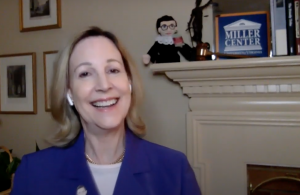
As the nation mourned Justice Ruth Bader Ginsburg’s death, Barbara Perry — the Director of Presidential Studies at the Miller Center of Public Affairs — discussed the intensifying political battle over a vacancy on the Supreme Court ahead of November’s general election. Perry, whom WUVA last interviewed on the 2018 confirmation of Justice Brett Kavanaugh, reflected on Ginsburg’s legacy and historic status as only the second woman appointed to the nation’s highest court.
Ginsburg died on Sept. 18 at the age of 87 following a battle with metastatic pancreatic cancer. Perry called Ginsburg a “hero,” a role model whom she “loved both personally and professionally.” Beyond achievements in the pursuit of gender equality, Perry expressed particular admiration for Ginsburg’s commitment to be aware “not of the weather of the day, but the climate of the age” when drafting her judicial opinions, including famous dissents in cases like Shelby County v. Hoyer and Bush v. Gore.
“I did know Ruth Bader Ginsburg,” Perry said, remembering the partnership between Ginsburg and husband Martin, who celebrated 56 years of marriage before his death in 2010. “You’d see them sitting at a dinner at the Court or in the audience listening to a lecture and they’d have their arms around each other. Just a lovely couple.”
Perry said that the media’s focus on the political implications of Ginsburg’s passing has been unprecedented.
“Of all the different stories that I have covered for media, from the passing of Justice Scalia to the passing of Bush 41, just anything you can name, especially in the last 10 years at the Miller Center, this has by far engendered — maybe pun intended — more curiosity,” Perry said. “Every kind of media, literally around the world, is interested in this story — not just because of Ruth Bader Ginsburg, I’m sure that’s part of it — but of course its impact on the election.”
Perry commented on the implications of President Trump selecting a nominee to succeed Ginsburg on the Court — likely to happen shortly, despite his party’s 2016 decision to block the confirmation of Merrick Garland due to the proximity of that year’s general election. At the time, Senate Majority Leader Mitch McConnell stated that the American people “should have a voice in the selection of their next Supreme Court justice,” and therefore “this vacancy should not be filled until we have a new president.” Senate Republicans denied Garland a hearing and ultimately confirmed Justice Neil Gorsuch after Trump took office in 2017.
Now that the Republican perspective on election-year appointments to the Court has changed in light of the potential to secure a conservative majority, Perry discussed the impact on the election.
“I think [Ginsburg’s passing] will only gin up the intensity, especially of Republicans on the right,” Perry said. “They somehow get more intense about Supreme Court appointments and issues like abortion than liberals, progressives, and those on the left. But maybe, particularly in light of the Black Lives Matter movement and in light of the rise of the left within the Democratic Party, maybe that intensity will be about equal … I will say that there’s also been a poll about a week or so ago when Americans were asked, ‘Which of the presidential candidates do you want to fill the next vacancy on the Court?’, the vast majority said, ‘Joe Biden,’ so that might have an impact.”
Perry predicted an effect on Democrats’ campaigns to regain control of the Senate through states like North Carolina, South Carolina, Arizona, Maine, and Colorado, saying that Republicans “are in trouble” in those locations.
“It’s hard to know exactly how this will play for them,” Perry said. “That’s the one key that I think Mitch McConnell cannot predict, though he is an astute politician … It’s not as clear cut as it was in 2016 for him. There was really no downside to him because Democrats don’t fight back enough or they don’t fight back enough effectively. But he has to be really careful about those swing Senate seats and those key states.”
Perry also explained concerns that if President Trump does not accept the outcome of the upcoming general election — as he told Fox News is a possibility in a July interview — a constitutional crisis could erupt if the Supreme Court divides 4-4 on the legitimacy of the national results with Ginsburg’s seat still vacant.
“If [President Trump] is not winning or he thinks he’s not going to win after the election day and he is questioning all sorts of counts, particularly because of mail-in ballots, we already know that he and his team are launching a number of litigation strategies and possibilities around the country, I would say particularly in these swing states,” Perry said. “This is how the process works — if the Court divides in half, 4-4, then the actual precedent of the case is at the bottom level; that’s either a State Supreme Court or a Court of Appeals. It’s lower than the U.S. Supreme Court. They say, ‘That’s just the case that has been decided in that state or in that federal district,’ and it doesn’t set a precedent for the country … If the Court divides, they simply hold in place the lower court opinion, state or federal, and then it applies to just that state or that circuit. So imagine the next level of confusion that would happen for having only eight members of the Court.”
As for who Trump will nominate, Perry identified possible choices including Judge Amy Coney Barrett from the Seventh Circuit Court of Appeals, former Solicitor General Noel Francisco, Senator Tom Cotton from Arkansas, and Senator Ted Cruz from Texas.
“These people have great backgrounds,” Perry said. “[Trump] has 40 other people on the list. I went to the Heritage Foundation in the first 100 days of the Trump administration to do a Miller Center exercise with them, and I have to tell you, a lot of middle-aged and elderly white men were gleeful — gleeful is not too exaggerated a term [to describe] the look on their faces when they would say to us, ‘You know, sometime in the next four years, we’re going to get to replace Ruth Bader Ginsburg,’ and they would almost spit out her name with contempt. It was painful, frankly, to see, but that’s how they feel … They’ll find a rock-ribbed conservative and they’ll try to ram that person through either before the election or during the lame-duck session.”
















